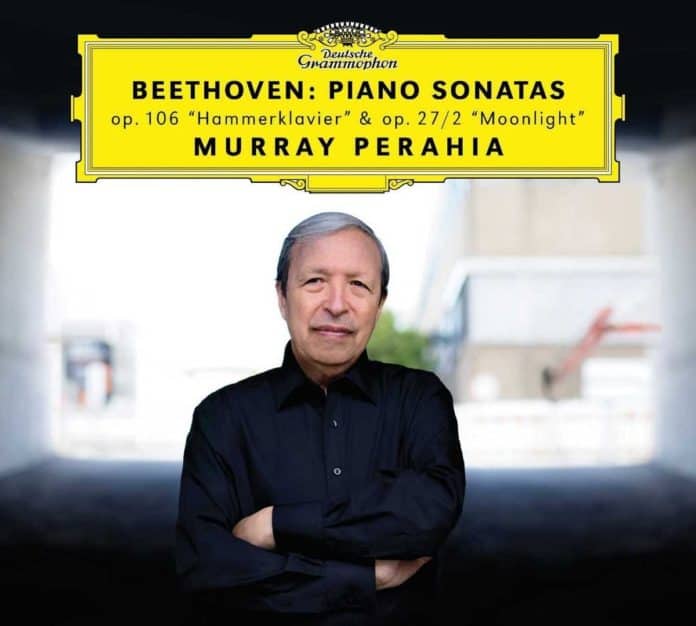This has been an anticipated release. Perahia recording two of the most famous Beethoven piano sonatas. Do we need another recording of the Moonlight and the Hammerklavier I hear you ask. When it comes to this new album the answer is yes.
In Perahia’s hands even the Moonlight sounds different, for he has prepared his own edition of the score. Yes, the differences are really minor but his handling of the dynamics and pedalling are obvious. The first movement is treated more like a Fantasia with nuances that make the main motif sound so dreamy yet transparent. Perahia believed Beethoven might have been inspired by an article about the Aeolian Harp that appeared in the Allgemeine musikalische Zeitung — the Aeolian Harp being a very popular instrument at the time. In the final movement Perahia rounds off the arpeggios by emphasizing the notes at the end of each one, thus producing a sound louder than usual. This is a fast, impressive rendition of the finale. True there are recordings with more rubato, and pianists who perform this even faster, but the overall impression of the Perahia performance is that of subtle command.
The highlight on this recording, though, is the towering interpretation of the Hammerklavier. Here we have one of the most technically demanding and impressive pieces of the piano repertoire in an ideal interpretation.
In the trailer by Deutsche Grammophon Perahia talks about the Hammeklavier and says he played it a few times when he was 25, but wasn’t happy with they way he played it. So he let time pass and waited until he gets older. Apparently the time has come and as he says: “I thought Maybe I’m ready to put down some thought about it”. For me this last sentence marks the words of a true artist. Notice how he says “some thoughts” — there is a humbleness in this phrase, as if he is is aware of the limits of the artist who can only approach the music of great composers like Beethoven and not define it. (And who knows, he might as well re-record it in the future…)
Nonetheless, his interpretation of the Hammeklavier belongs to the great ones. Perahia storms in the first movement, his tone clear and precise. This is all very impressive but the difficulty of the piece is threefold: a pianist needs to have a strong, commanding technique – the playing should be both clear and powerful. At the same time the lyrical moments (and there are plenty) should be softer, ideally with a crystal clear quality. Finally, the structure of the piece should be revealed not only within each movement but gradually, by the end of the piece as a whole. Does this sound difficult? Well, Perahia manages all this and then some.
Listen to the extra care with which he handles the Scherzo, transitioning from one theme to another as if this the only right way to do it… And then there is the sublime Adagio Sostenuto…. At just 16 minutes, it’s on the fast side (Barenboim’s also impressive accounts on EMI and DG clock in at 21 minutes). But Perahia, a pianist not just famous for his Bach recordings but also for his sensitive approach to the romantic repertoire, pours all his distilled poetry here. This is not the kind of Adagio that drags on forever and can often sound as a harbinger of nostalgia, but a no-nonsense interpretation of human pathos.
After the ethereal qualities of the Adagio, the daunting force of the final movement brings one back to the real world. From the opening Largo, the decisiveness of Perahia’s playing is a sign of the things to come. I have to admit that in the beginning I was sceptical: Will Perahia’s touted soft-touch pianism bring off the mighty Hammerklavier? As mentioned, above, here his pianism is everything but soft. The sudden eruptions, the short notes, the attacks — everything is executed to perfection here. And when it comes to the famous fugal passages, Perahia’s precision at such a fast tempo is amazing.
When was the last time a recording revealed so clearly the underlying structure while maintaining momentum? For me this final movement is the real to test whether a pianist is capable of delivering a first-class Hammerklavier. Perahia’s account is not just first-class, but what we have here is one of the few great performances of recent years.
Rating: ***** (5/5)
Beethoven, Piano Sonatas 14 & 29
Murray Perahia (piano)
Deutsche Grammophon







Great review! I just published mine on the same album some hours ago and come to the same conclusion by the way. It’s really a great album.
Thanks! Yes, we seem to agree as I wrote on your blog! The more I listen to it the more I like it!
Agree. It’s really good.